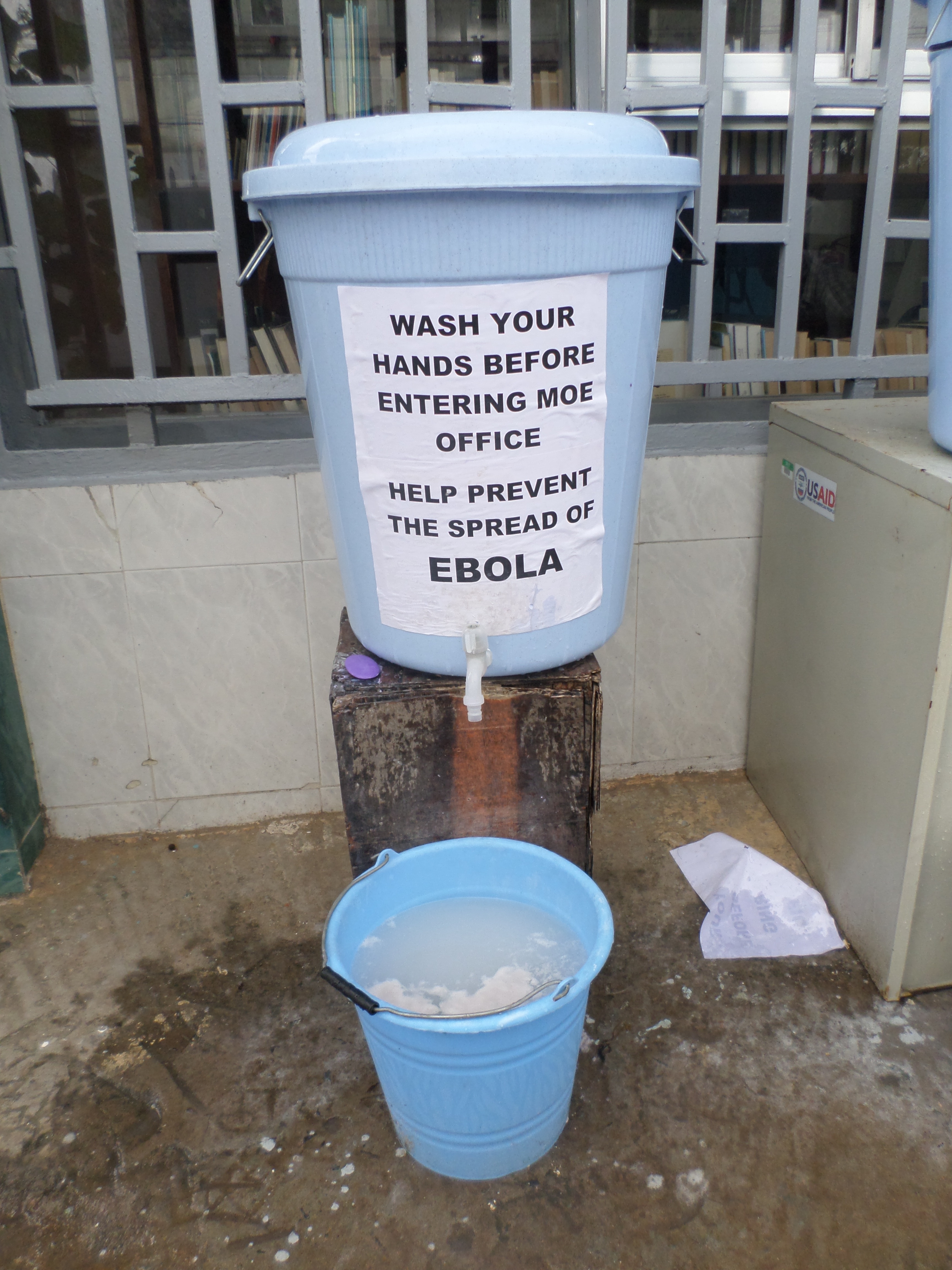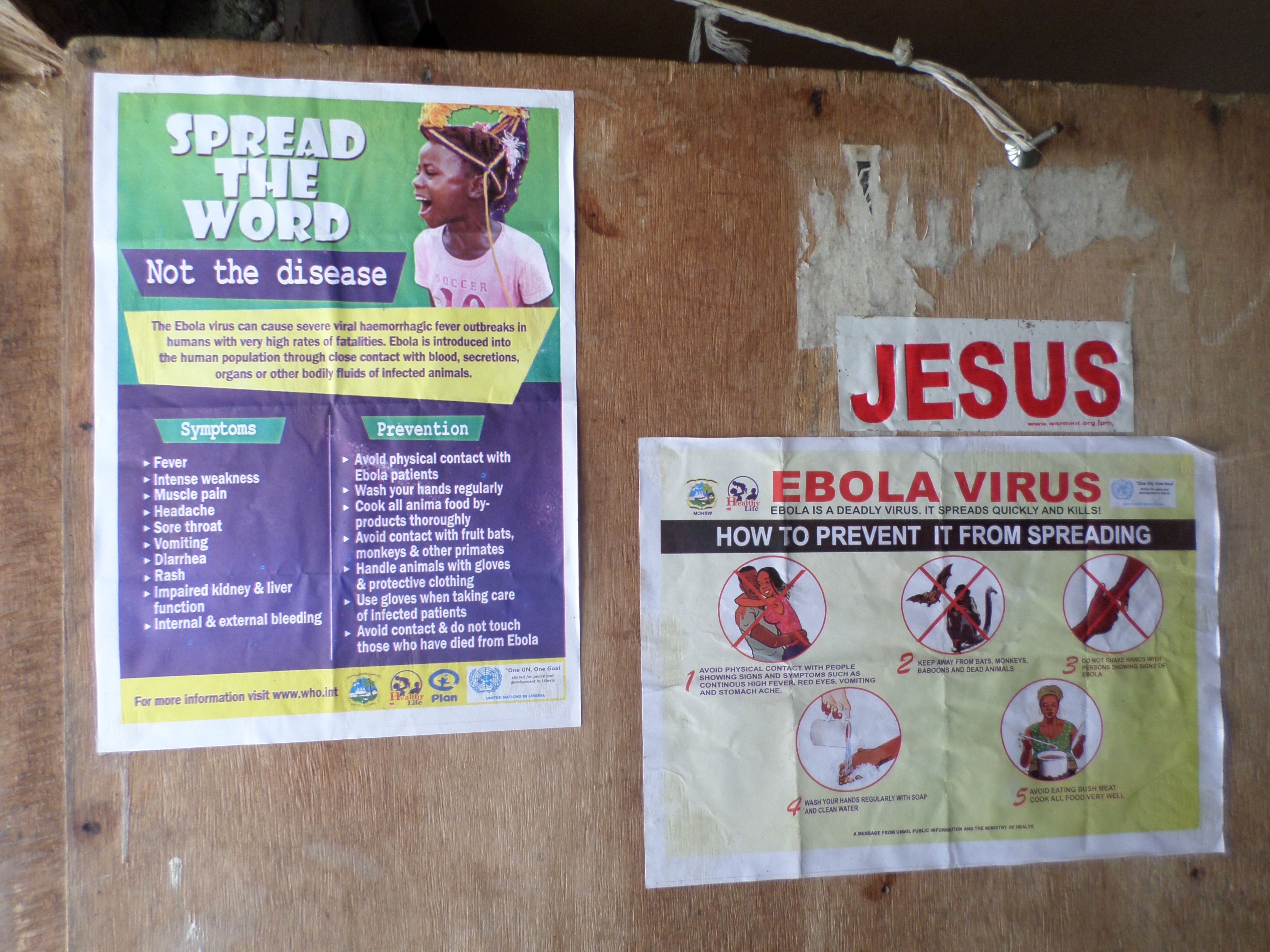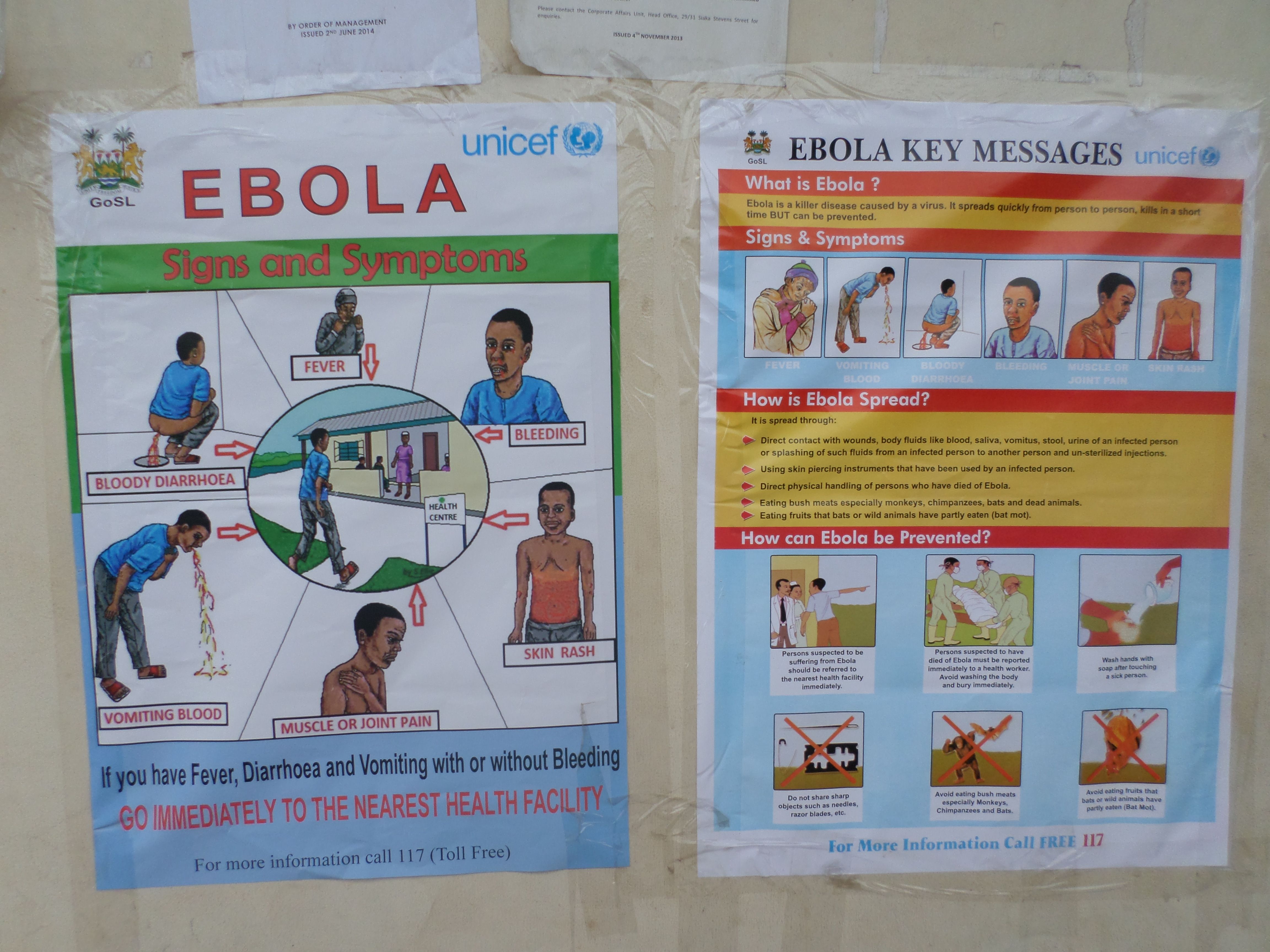Coming back to Sierra Leone at the end of June and traveling on to Liberia in July, I’ve seen a big change. There have been hundreds of deaths, and people are definitely taking the issue more seriously now.
The virus is primarily spread by contact with the bodily fluids of an infected person, so one of the precautions advised is to not shake hands with people. But I’m finding that very hard in Sierra Leone and Liberia. We shake hands with everyone we meet. A driver told me, “I carry all kinds of people in my car. My children are playing with all kinds of children and then we all sit together at home. What can I do?” I was sitting in a crowded public transport vehicle in the Red Light neighborhood, just outside Monrovia the other day, waiting for the vehicle to fill with passengers so we could leave. A vendor came by, hawking green garden gloves, boasting that they could be used to prevent Ebola. People around me laughed.
It’s only in the last few days that I now see hand-washing stations outside government ministries and some NGOs (though not all). It seems a little futile when the same people go out to eat in the same cook shops with the same shared utensils.
Education about the virus and how it spreads is now seen as the main public health task. In “West Africa: Misconceptions Fuel Ebola Outbreak”A UNICEF spokesman explains, “Some people still deny that the disease is real. Others believe that it doesn’t have to be treated.” The article goes on to explain that, “Widespread misconception, resistance, denial and occasional hostility in some communities are considerably complicating the humanitarian response to contain the outbreak.” I’m reminded of what I heard in West Africa in the nineties, that AIDS stands for “American Invention to Destroy Sex.” There is a long history of lament that Africans don’t believe what we’re telling them about their own health crises, cries of we need more education! Ignorance is the biggest enemy!
In Monrovia, I was told that there have been real impacts on the health system. People are afraid to go to the hospital and health workers are refusing to treat people. So, I was told, even a small sickness can kill you because there is no one to treat you. (See “Fighting Ebola ‘by the Grace of God’” detailing panicked health workers in Liberia abandoning their work stations.)
The coverage I’ve heard on the BBC and elsewhere focuses on how dangerous it is for people not to comply, and experts decry the ignorance of people who don’t understand that these actions are for the health of the population as a whole. Sierra Leonean firebrand, and special assistant to the President, Sylvia Blyden, makes the point that it is not only uneducated rural people who are acting this way. Even people in the more cosmopolitan capital are fighting against the public health restrictions. She recently posted on Facebook:
Esteemed members of SIERRA LEONE ISSUES, well the “gullible” people are not only in Kissi Teng, Kailahun. Tonight, credible reports are that a suspected Ebola patient has escaped from Isolation at PCMH Cottage [Hospital], Fourah Bay Rd. in Freetown with help of her friends and family. She was reportedly admitted in isolation whilst waiting for her test results from Ebola lab in Kenema. Well, to cut a long story short, she was forcibly removed from the Isolation room and then, was put onboard an okada motorbike and whisked off to her residence somewhere in Freetown. One of the nurses on duty was seriously SLAPPED for attempting to stop the escape.
Enti na Kissi Teng, Kailahun, some bin day cuss “munku” and “gullible”? [In English: Isn’t it true that in Kissi Teng, Kailahun, some people were cursing people for their lack of exposure and gullibility?]
I feel like a lot of the coverage of the Ebola crisis has been about the heroic health workers and the ignorant locals. I don’t dispute the heroism of the health workers, but I do want to dispute the ignorance of the locals. People on radio call in shows have asked: Why can’t they understand what needs to be done? Why they need to submit themselves and their loved ones to quarantine? When someone has the symptoms—fever, vomiting, diarrhea—they are supposed to report to the health center, where they will be taken away from family, and if they die, be buried by men in protective gear with no family present. You can see why people might be loath to turn over their loved ones. Really who among us would want to turn a sick loved one over to a hospital staffed with foreigners, knowing we might never see them again? And hospitals in this part of the world have notoriously poor service. Families routinely have to prepare meals and bring them to patients. Families have to go to local pharmacies to buy drugs and even gloves or needles from India or Nigeria because hospital storerooms are routinely not stocked. People’s apprehensions about the failings of the healthcare system come from experience, not from ignorance.
At least some commentators have pointed out that this crisis really reveals people’s mistrust of the state, that’s why they don’t do what they’re told. One expert on a BBC call-in program explained this was understandable in the aftermath of war. I would argue that it’s far deeper than that. It’s not just the war that caused this mistrust. The mistrust existed long before. Furthermore, the issue is more than people ignoring public health warnings from the state. People believe that the state is actually out to get them; more precisely, that “big men” are using the apparatus to of the state to enrich themselves at the expense of ordinary people, sometimes at the expense of their lives.
Some folks standing outside JFK Hospital in Monrovia told me that there is a spray, a chemical spray, that if they say you have Ebola, they spray it on you and that’s what actually kills you. They explained that the health ministry is using it so they can report more deaths from Ebola and get more money. They said the government already got $1.8 million in March so they know there is money in it.
A friend recounted a story that in one of the poor neighborhoods some group was giving vaccinations against Ebola (“But there is no vaccine,” I protest. “Doesn’t matter. People don’t know that,” he replies.) He says two babies died almost immediately after receiving the shots, and the medical team vanished afterwards, now no one knows who gave the shots. “Someone must have been poisoning the children to make it look like more Ebola deaths!” This is an unsubstantiated rumor, but the important thing is how the rumor was spread by average, even well educated, people like my friend. He said that people think it is someone in or near the government who is getting rich off of the money that is coming into the country to battle the epidemic, and wants the situation to continue to look dire. When I sounded doubtful, my friend gave further evidence. He told me that the Chief Accountant at the Ministry of Health was preparing to make a report to the donors of how all the Ebola response money given to the government had been spent so far. The evening before the presentation he was badly beaten by thugs, and they took all the paperwork away from him and nothing else. Clearly, my friend argued, someone has something to hide!
So, is this a case of ignorance? Or do these beliefs tell us something more? I think the rumors reveal something about the nature of the state here and people’s so-called contract with it. The state has acted in just such a vampiric fashion in the past, feeding off of the misery of its citizens, and likely will continue to do so. They are not responding out of ignorance, but again I would argue, out of long experience.
Susan Shepler is Associate Professor of International Peace and Conflict Resolution in the School of International Service at American University in Washington DC. She is currently conducting Spencer Foundation funded research in Liberia and Sierra Leone on connections between Western education, the state, and armed conflict.



July 29, 2014 at 9:01 pm
You seem like a very carrying person. Say safe!
August 17, 2014 at 11:23 am
Thank you.
July 29, 2014 at 10:01 pm
Congratulations on being Freshly Pressed.
July 29, 2014 at 10:08 pm
As someone who lives in Sierra Leone the majority of the year I want to thank you for an honest look at some of social issues surrounding the outbreak. I have many friends who are not ignorant or ‘stupid’ people and yet they are unsure what to believe. Fear takes many forms and fear is a condition sadly many were brought up with in Sweet Salone. It is with fear that people act in all kinds of ways in response to this crisis. I am sure that if Ebola were in my native UK there would also be many people unhappy about people in protective clothing coming into their homes and removing them! The West judges people harshly in West Africa and yet the circumstances around this disease are scary.
I am interested to see what the long-term impact is on the Salone economy… it is so sad to see a country that is rising out of years of poverty and negative stereotypes once again be knocked back…. this time by a disease that is as damaging in its reputation as it is in its physical impact on society.
Thanks for your article.
July 29, 2014 at 11:11 pm
Reblogged this on JoinedUpThinking and commented:
Well written and quite informative. Thanks.
July 30, 2014 at 4:49 am
How sad that the people have been exposed to such corruption that the first conclusion they are led to is someone is out to get them. I can’t say it’s so different in the states, viruses here are “exaggerated by the media”, and even terrorist attacks are blamed on the government. It’s easy to point and say ” ignorance ” when you’re not in the panic yourself.
July 30, 2014 at 1:15 pm
Educators and health profession team members are needed to rescue the the remaining population.
July 30, 2014 at 2:59 pm
Culture, i.e., modes of communication, is worth looking into. It seems that people exchange stories and info through word of mouth (rumors to be exact) and that it is imperative that they trust first, before they believe.
July 30, 2014 at 3:10 pm
great post Susan, Just hoping to hear something like a cure being found for this vampire disease
July 30, 2014 at 4:13 pm
Reblogged this on soulfultune and commented:
Such a deep article that deserves attention. What are your thoughts on this? I personally understand why the citizens feel the way that they do because I too believe that you cannot trust the government but I also do believe that if they don’t want to go to hospitals do the basics and wash your hands and prevent from spreading it to the point the hospital isn’t needed.
July 30, 2014 at 8:36 pm
I’m in Ghana and no case has been recorded yet. Not denying the fact that these are neighboring countries the information here is very educative. Thank you.
July 31, 2014 at 2:34 am
Reblogged this on genamicheal's Blog and commented:
Latest on EBOLA virus menace
July 31, 2014 at 6:14 am
Reblogged this on Jonah's Reblogs….
July 31, 2014 at 8:01 am
I really wish above all that a cure for Ebola would be found.
July 31, 2014 at 6:42 pm
Such a complex situation really well explained. Coverage by large parts of the UK media consists of the usual scare-mongering and simplistic nonsense – thanks for sharing your insight.
August 1, 2014 at 10:33 am
a problem that can’t be ignored. how sad.. great read though
August 1, 2014 at 3:49 pm
Reblogged this on sotonz's Blog.
August 2, 2014 at 5:03 pm
self help is what they need most. back to healthy and natural way. God Bless!
August 3, 2014 at 10:30 am
We have been facing a similar problem in South Africa with regards to HIV and AIDS. We started hearing things from normal educated people that the traditional healers or ‘Samgoma’s’ in the rural areas were telling people that condoms were an apartheid regime devised tool to prevent black people from having babies and thereby taking over the country. This was post the fall of apartheid and post Thabo Mbeki’s election as our president.
It has been heartbreaking to watch people here succumb to the disease and then once infected, continue to spread the disease because they were told by the Sangoma that white people lied about the disease spreading through sexual contact.
We fight an uphill battle to this day and the root of all the mistrust and suppositions is lack of education, which was one of the biggest human rights violations of the Apartheid regime, in my opinion, because it’s affected more than just one generation. The tide is turning albeit slowly.
August 4, 2014 at 11:51 am
Reblogged this on Leading the Sheep (no finer feeling) and commented:
Ebola..? What’s REALLY goin’ on!
August 4, 2014 at 11:50 pm
I wish they do find a cure I know that they say he is getting better god bless him…
August 5, 2014 at 6:27 am
Reblogged this on gloryelstone's Blog.
August 6, 2014 at 1:34 am
People here in Atlanta and around America are upset and paranoid about the the two Ebola infected people that have been returned here to be treated at Emory Hospital. The criticism and overreaction are understandable but unfounded. There’s a bigger chance of getting the truth out of Barack Obama than the risk of Ebola getting out of Emory.
August 7, 2014 at 10:25 am
check this link http://mosopelove.wordpress.com/2014/08/06/ebola/ on my experience concerning this Ebola issue
August 7, 2014 at 10:52 am
Reblogged this on WELCOME TO MOSOPE'S BLOG.
August 10, 2014 at 1:35 pm
Well written article and I agree that ignorance is not completely to blame. Fear, mistrust and rumors continue to abound and many aren’t completely sure what they should believe. I personally hope a cure that would be accessible to all affected would be found soon.
August 11, 2014 at 2:48 am
Reblogged this on Badan Eksekutif Mahasiswa Universitas Tanjungpura.
August 17, 2014 at 4:57 pm
Very sad case but indeed true. Folks in Nigeria are taking the warnings seriously now but I am afraid we still have far more ignorant people that just wouldn’t listen. Ha!
August 18, 2014 at 2:37 pm
This post has opened my eyes to the situation and the opinions of the locals so much! Thanks for sharing what you know.
September 1, 2014 at 5:10 am
Reblogged this on Dear Beloveds.